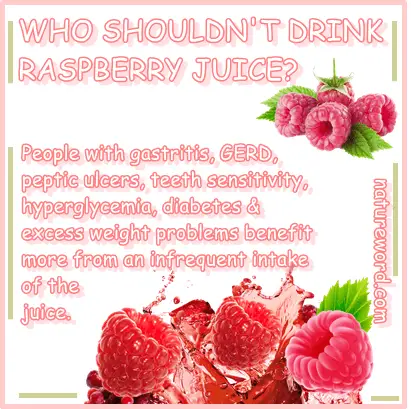Like raspberry juice but wondering if it’s good for you? While there are clearly many benefits to drinking raspberry juice, are there side effects too? Does raspberry juice have contraindications? Is raspberry juice bad for some people? Who shouldn’t drink raspberry juice and why?
No food is good for absolutely everyone and not all foods should be consumed with the same frequency and in the same amounts by everyone. The same is true for raspberry juice which can turn out to be a source of side effects for some consumers, some more serious than others. Find out what are the side effects and contraindications of the seasonal berry juice and who should avoid it.

7 People That Should Avoid Drink Raspberry Juice
-1 People with gastritis: raspberry juice flares up gastritis
If you have an active gastritis, that is, a gastritis that has not yet healed and you are struggling with, drinking raspberry juice regularly will ensure you don’t get rid of it soon. Raspberry juice is a source of organic acids which work up the stomach and stimulate the production of gastric juices. This exerts an irritating effect and adds to the inflammation of the stomach lining, causing flare ups in the condition.
Organic acids are compounds occurring naturally in raspberries and all fruits, and their juices.
Some fruits have a higher content of organic acids than others e.g. oranges, lemons, limes, cranberries etc. Of all raspberry colors, red raspberries have the highest content of organic acids while yellow raspberries are lowest in organic acids, as evidenced by their mellow, straightforward sweet taste.
Find out more about what foods to eat and to avoid for gastritis.
2-People with GERD: raspberry juice triggers acid reflux
Gastroesophageal reflux disease, abbreviated to GERD, is a digestive condition that causes the backflow of gastric juices, ingested fluids and sometimes also partially digested food particles. It is better known as acid reflux disease because the stomach juices that get regurgitated are highly acidic and cause symptoms such as heartburn, a burning sensation in the back of the throat and a bad, acidic taste in the mouth.
Drinking raspberry juice can trigger an acid reflux episode in instances when the disease is active and severe. The general recommendation is to avoid fruit juices, and vegetable juices too, if you regularly experience more than three episodes of acid reflux per week which qualifies as having the disease. Discover what foods you can eat and what foods you need to avoid in an acid reflux diet.

3-People with an ulcer: raspberry juice is bad for peptic ulcer
A peptic ulcer is a sore or open wound on the lining of the stomach (gastric ulcer), lower part of the esophagus lining or the first part of the intestinal tract (duodenal ulcer). Eating and drinking anything that stimulates the production of gastric acid and triggers acid reflux can exacerbate the condition and cause flare ups in those with the disease.
Eating a relatively bland diet, predominantly vegetarian, ideally also low in fat, and excluding processed foods and fried foods as well as spicy, sour, fermented and acidic foods and beverages are strongly advised for peptic ulcers.
Acidic, sour and fermented juices such as raspberry juice and, to a greater extent, lemon juice, orange juice and lime juice, pickle juice or pickled cabbage juice can exacerbate the digestive condition and predispose to complications such as bleeding.
More on raspberry juice and peptic ulcer
Of course, a person’s diet as a whole weighs more heavily than the occasional consumption of a food or beverage that is not specifically good for the condition, as in therapeutic.
That is, you can probably have some fresh raspberry juice safely even with a gastric or duodenal ulcer, provided intake is fairly limited and consumption infrequent. And the rest of your diet on point.
Also, a home-made fresh raspberry juice is less likely to produce side effects whereas store-bought juice or juice from raspberry concentrate are best avoided for the most part. Store bough fruit juice is often pasteurized, after which acidity correctors, flavor agents, organic acids, preservatives and other fruit juices are reintroduced – this type of juice is not a good option for someone with an active and severe digestive condition such as a peptic ulcer or gastritis.
It may also help to choose yellow raspberry juice over red raspberry juice – yellow raspberries are the least acidic of all raspberry colors; vs yellow, red raspberries are the most acidic. Black and purple raspberries are somewhere in between in terms of acidity. See what are the benefits of eating yellow raspberries.
4-People with teeth sensitivity: raspberry juice sensitizes teeth
If you have issues with teeth sensitivity, then fruit juices are something you might be better off not having too frequently. Raspberry juice, especially red raspberry juice, is a source of tart organic acids and will cause teeth sensitivity and even pain in those with already sensitive teeth.
If you have sensitive teeth but still want to enjoy the wonderful benefits of raspberry juice, which include benefits for teeth and gums, you can go for yellow raspberry juice instead of red. Also, look for a pure raspberry juice that is not mixed with other fruit juices, or simply make your own fresh, at home.
5-People with high blood sugar: raspberry juice raises blood sugar
Drinking raspberry juice, and fruit juices in general, is contraindicated in hyperglycemia or high blood sugar. Fruit juices have all the sugar content in the fruit, but none of the fiber to slow down its absorption in the bloodstream, unless they are made with pulp which is unlikely in the case of raspberry juice.
The serving size for juice is also usually bigger than the serving size for fresh fruit, not to mention it’s easy to have more than one serving of juice, which means you end up getting your fill of sugar. Store bought juices also often have added sugars.
Overall, if you have high blood sugar, it’s important to know that fruit juices, however natural, will spike your blood sugar levels which it’s why it’s best to consume them in limited amounts, preferably infrequently. Ideally, go for the whole fruit instead.
6-People with diabetes: raspberry juice spikes blood sugar
Raspberry juice is best avoided in diabetes, and all fruit juices actually. Diabetes is a disease of the metabolism that is characterized by a difficulty keeping blood sugar levels within a certain limit which is a driving factor for tissue damage leading to system complications (e.g. poor healing wounds, vision problems).
Fruit juices are best avoided in diabetes, or, at most, consumed infrequently and in very limited amounts, because they supply more sugar per serving vs whole fruits, but no fiber to temper the absorption of sugar in the bloodstream. This creates the potential for spikes in blood sugar, even with juices naturally lower in sugar such as pure raspberry juice.
It’s also often difficult to control how much juice you drink because it’s so good and it’s easy to have more servings at once, not to mention the bulk of commercially available fruit juices have extra sugar added to them.
7-People with weight problems: drinking raspberry juice accentuates weight gain
Drinking raspberry juice accentuates weight gain. Excess body weight is a known risk factor for many different types of diseases, from metabolic diseases such as diabetes to heart disease. Fruit juices in particular provide a lot of sugar to the diet and, with it, unnecessary calories.
If you drink juice every day, whether it’s raspberry or cherry or orange or apple, you add to your daily calorie intake and may observe weight gain after some time. It’s also quite easy to indulge in fruit juices, the taste factor being the driving force behind overconsumption and associated side effects.
